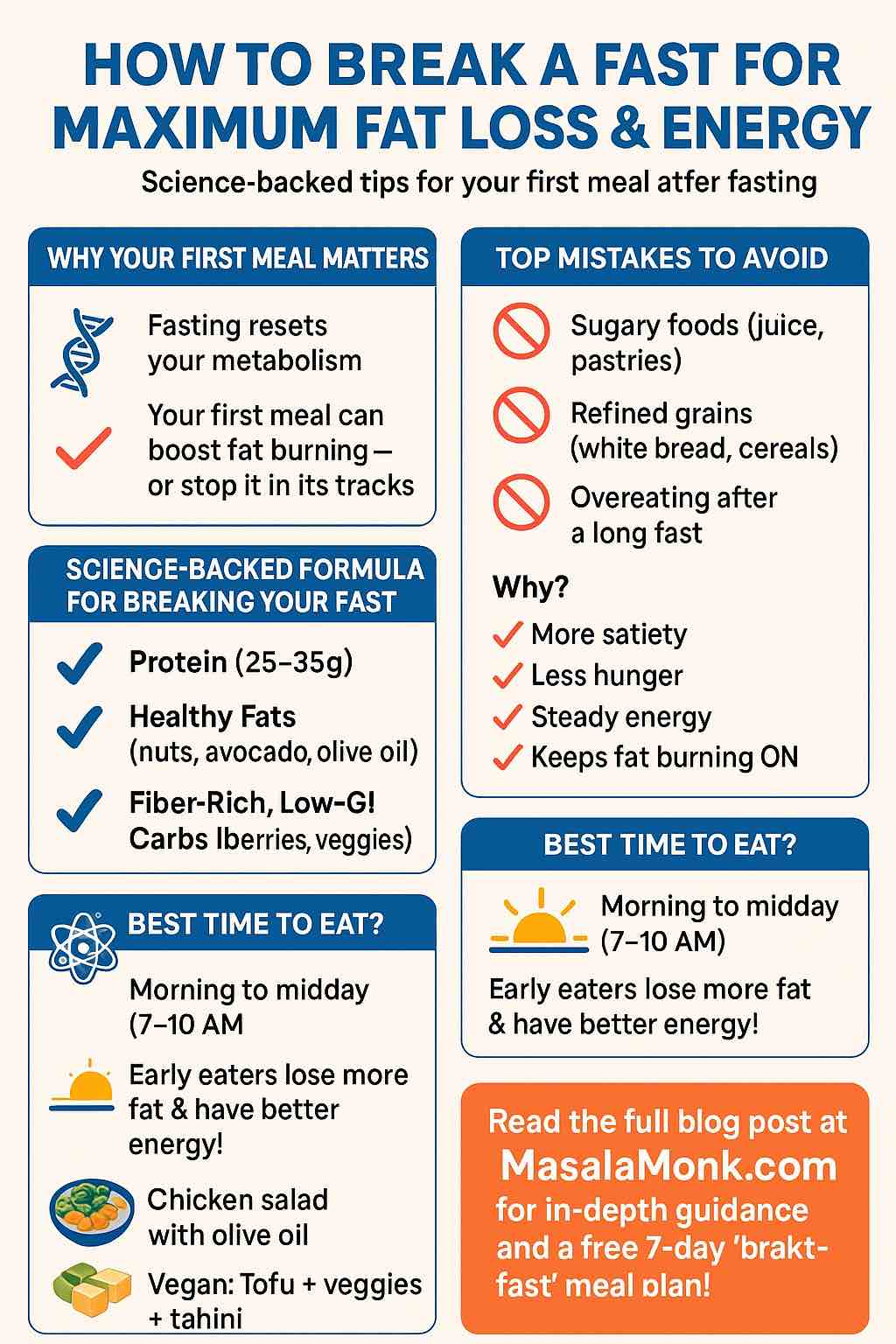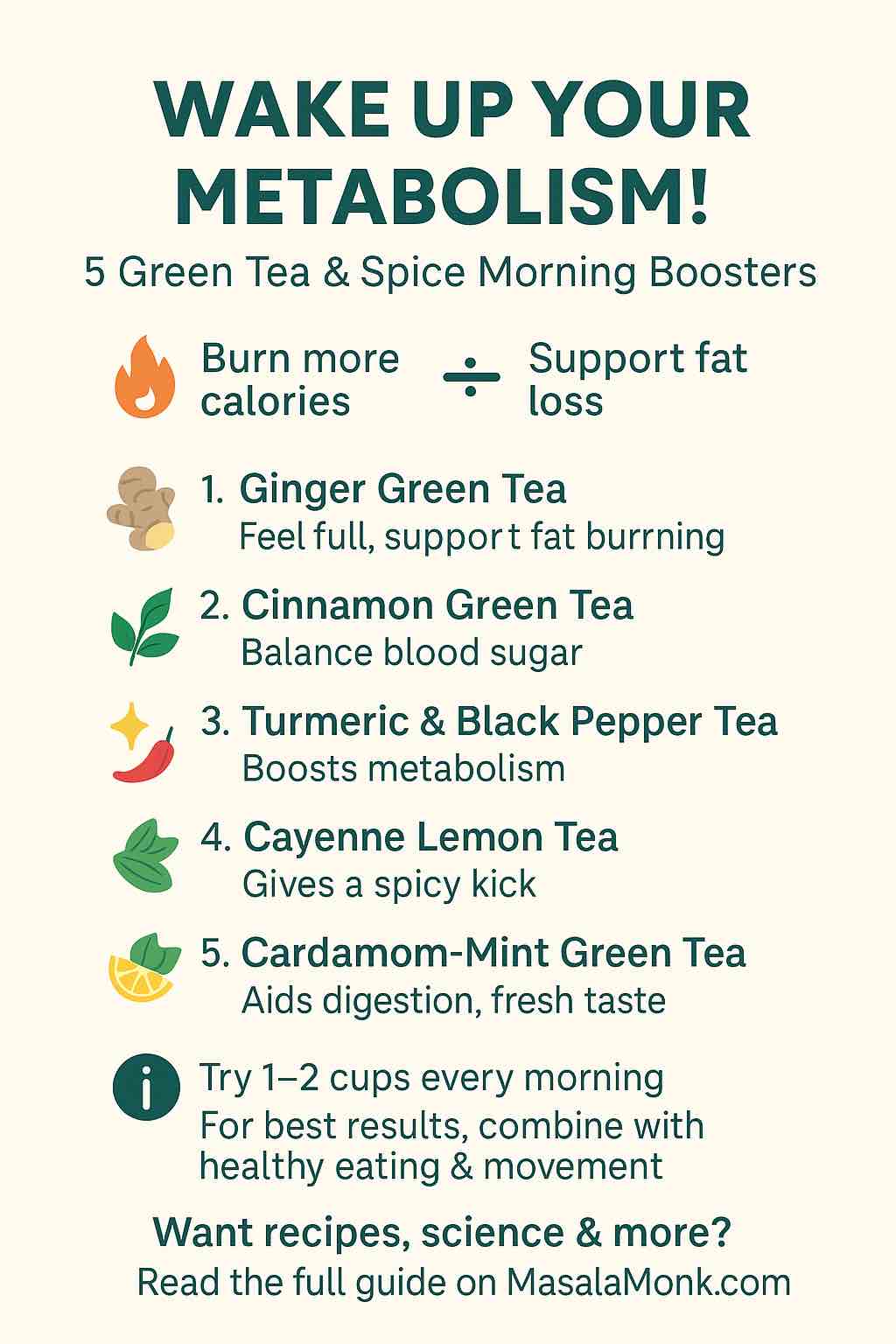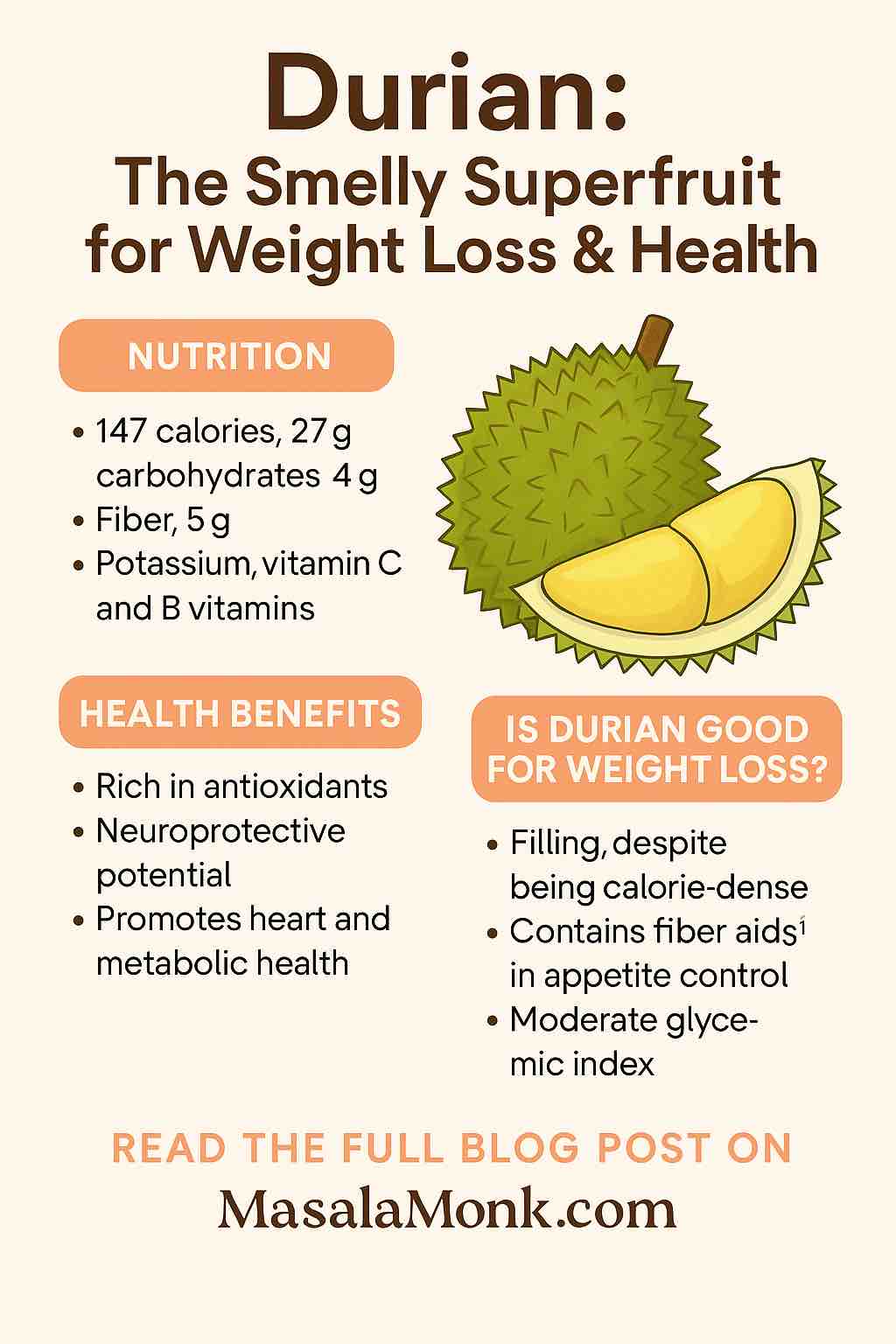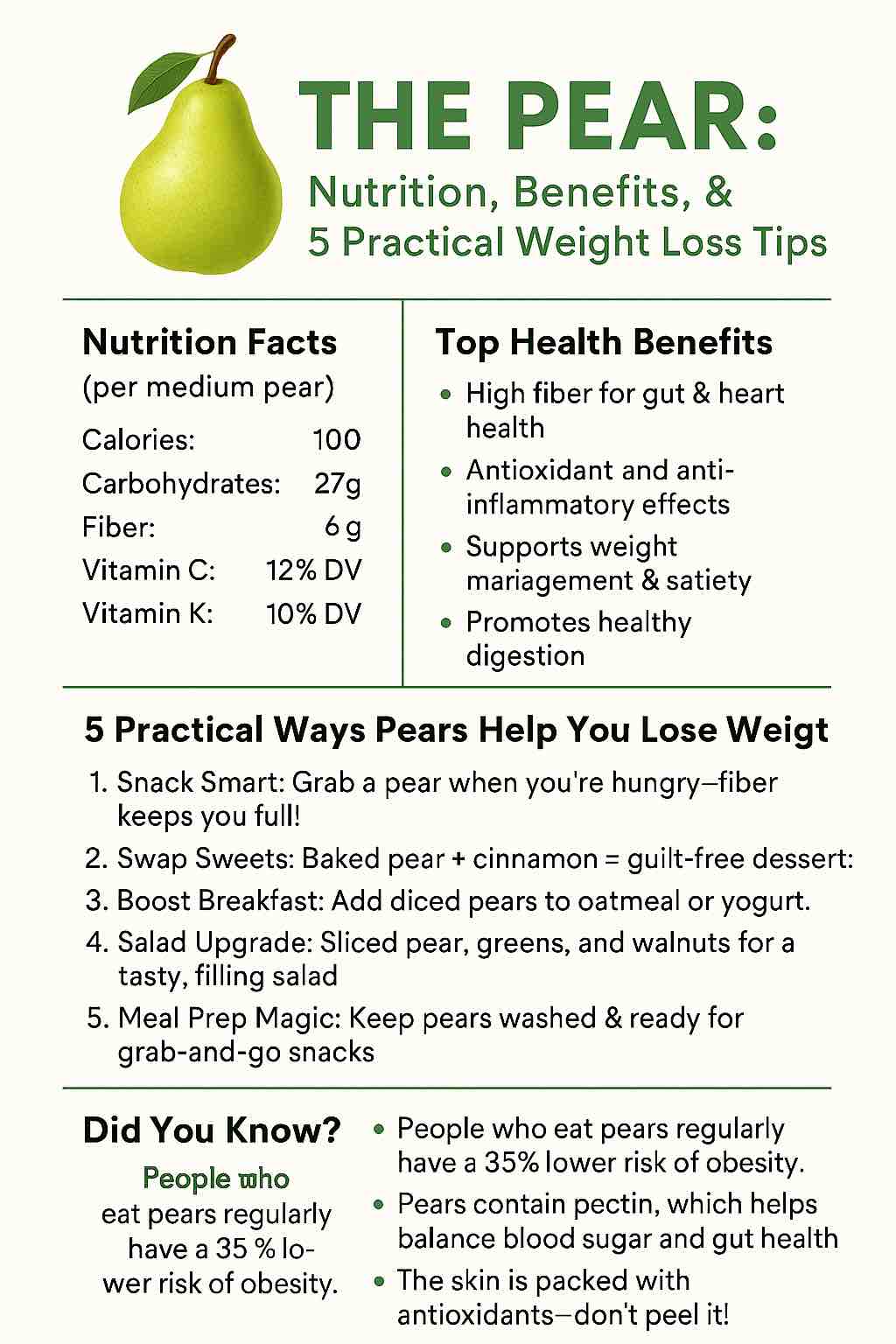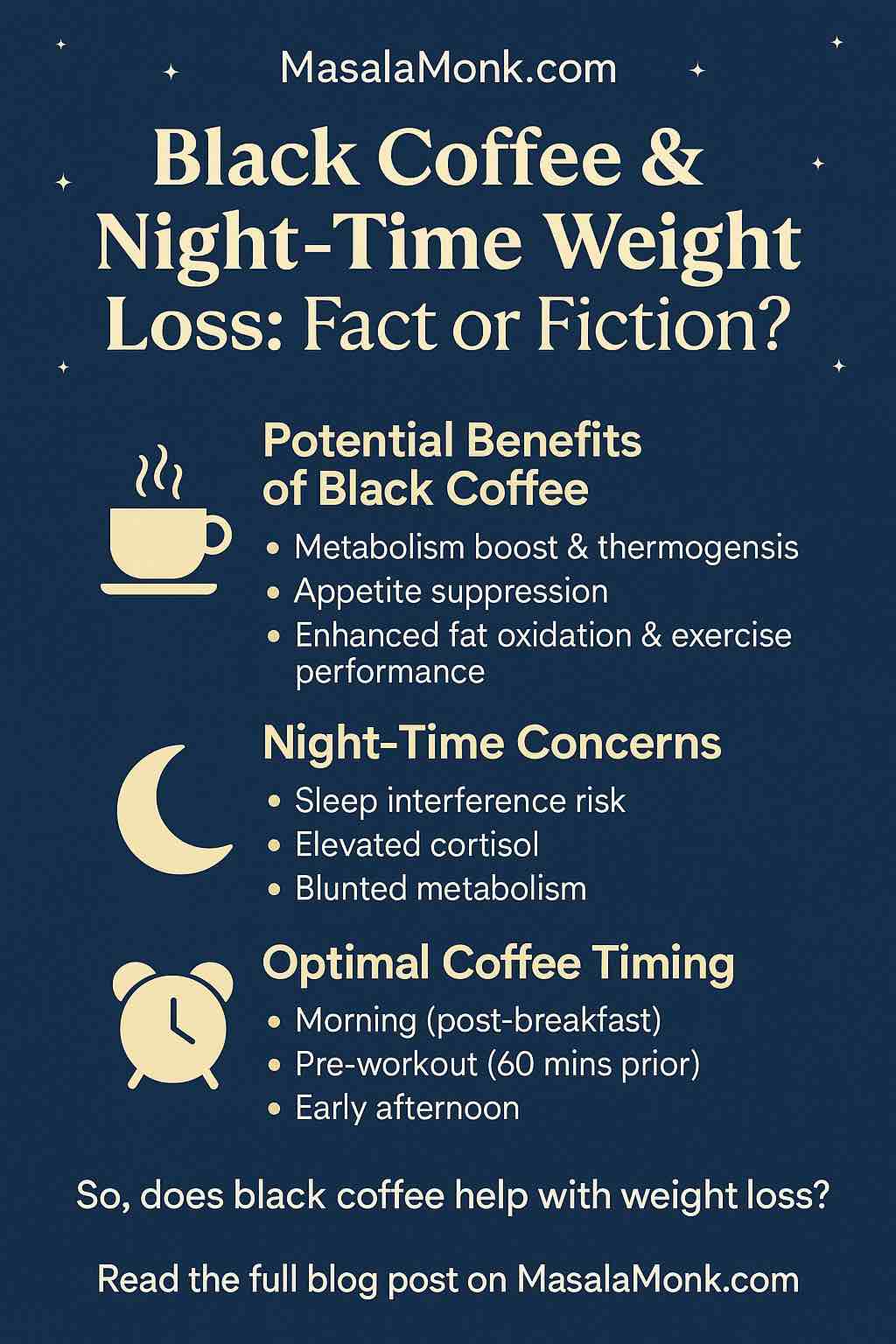
Is a cup of black coffee your secret weapon for night-time fat loss, or just a buzzworthy myth? Let’s cut through the noise and dive deep into the latest research, so you can sip smart and lose weight wisely.
☕️ The Allure of Black Coffee for Weight Loss
We’ve all heard it: “Drink black coffee at night to torch fat in your sleep!”
It’s tempting—black coffee is calorie-free, rich in antioxidants, and (let’s admit it) a comfort at the end of a long day. But can that after-dinner cup really move the scale in your favor, or does it come with strings attached? The answer is more nuanced than any quick-fix headline.
🔬 What the Latest Science Actually Says (2025)
1. Coffee Supercharges Your Metabolism—But Timing is Everything
- Caffeine, the main active ingredient in coffee, increases your resting metabolic rate by 8–13% for a few hours after drinking. This is real—your body burns more calories at rest, even as you scroll your phone or watch Netflix.
- Black coffee is especially effective because it’s nearly zero-calorie. No sugar, no milk, just the pure metabolic boost.
The catch:
- This effect is temporary (lasting 1–3 hours), and tolerance builds up if you’re a daily coffee drinker.
- Most research agrees: drinking black coffee in the morning or before a workout maximizes this benefit. The further you push coffee toward bedtime, the more likely it will disrupt sleep—and sabotage weight loss in the long run.
2. Night-Time Caffeine: Double-Edged Sword
- Sleep matters more for weight loss than almost anything else.
- Even if coffee gives a small nighttime metabolic boost, if it costs you 1–2 hours of good sleep, you risk hormonal imbalances (higher ghrelin, lower leptin), increased cravings, more late-night snacking, and slower fat loss.
- Clinical studies (2023–2025) show that 400 mg caffeine—equal to 2 strong cups—even 6 hours before bed can reduce total sleep time, worsen sleep quality, and raise next-morning cortisol.
3. Fat-Burning: Yes, But With Limits
- Coffee before exercise genuinely boosts fat oxidation—your body burns more fat for fuel, especially during cardio.
- It’s also a mild appetite suppressant: drinking a cup 30–60 minutes before a meal can reduce how much you eat (for some people, by up to 100–150 calories).
- But: Meta-analyses show that average weight loss from regular caffeine is modest—usually less than 2 kg per month, and only with other healthy habits in place.
4. Not All Bodies React the Same
- Your genes matter! Fast caffeine metabolizers (CYP1A2 gene variant) can drink coffee late and sleep like a baby. Slow metabolizers get insomnia, jitters, and little weight-loss benefit.
- If you’re sensitive to caffeine, even afternoon coffee can disrupt your night.
🕒 When Should You Drink Black Coffee for Weight Loss?
Best Times
- Morning (after a protein-rich breakfast):
- Reduces risk of cortisol spikes and blood sugar crashes.
- Pairs with your body’s natural circadian rhythm for energy and fat-burning.
- Pre-Workout (60 minutes before):
- Enhances fat oxidation, energy, endurance, and even motivation to move.
- Early Afternoon (before 2–3 pm):
- Maintains alertness, supports metabolism, but avoids sleep problems later.
Times to Avoid
- Evening and Night (after 3 pm, for most people):
- Even if you don’t “feel” it, caffeine can disturb deep sleep cycles.
- Poor sleep means higher risk of weight gain, cravings, and metabolic slow-down.
📋 The Practical Guide to Using Black Coffee for Fat Loss
1. Keep it Simple—Keep it Black
- Drink your coffee plain—no sugar, syrup, cream, or “healthy” sweeteners.
- Every extra tablespoon of sugar or cream can add 30–50 calories and blunts the appetite-suppressing effect.
2. Dose Wisely
- For most adults, up to 400 mg caffeine per day is considered safe (about 3–5 small cups).
- More isn’t better. Higher doses increase risk of anxiety, jitters, or gut upset, and the weight loss advantage plateaus.
3. Pair Coffee with Smart Habits
- Sleep: Prioritize at least 7–8 hours every night. Good sleep amplifies your body’s natural fat-burning.
- Diet: Focus on whole foods, protein, healthy fats, and fiber. Coffee is a tool—not a substitute for good nutrition.
- Exercise: Use coffee to power your cardio or HIIT. It’s most effective when paired with movement.
4. Listen to Your Body
- Track how you sleep after coffee.
- If your heart races or you toss and turn, shift your last cup earlier.
- Try alternating coffee with herbal teas, green tea, or water to avoid dependency.
🧬 Special Considerations: Is Coffee Right for You?
- Pregnancy, high blood pressure, anxiety, or arrhythmia: Ask your doctor before adding or increasing caffeine.
- Genetics: If you get anxious, jittery, or sleep poorly after coffee, you may be a slow metabolizer—opt for morning coffee only, or try decaf.
🚀 Sample Routine: Coffee & Weight Loss, Optimized
| Time | What to Do | Why It Works |
|---|---|---|
| 8:00 am | Eat protein-rich breakfast | Stabilizes blood sugar; prevents cortisol spike |
| 8:30–10 am | 1st cup black coffee | Boosts metabolism during high natural cortisol |
| 11:30 am | Light snack (protein/fiber) | Sustains energy; prevents blood sugar dip |
| 12:00 pm | 2nd cup black coffee (pre-workout) | Increases fat oxidation, stamina for exercise |
| 12:30 pm | Workout | Burns more fat; uses caffeine’s energy |
| 2:00 pm | 3rd cup (optional, if not sensitive) | Maintains focus; avoid after 3 pm for sleep |
| After 2:00 pm | Switch to water/herbal tea | Protects sleep and long-term metabolism |
🔚 Bottom Line
Black coffee is a science-backed weight loss ally, but only when you use it smartly.
- Morning and pre-workout are the best times for most people.
- Night-time coffee may backfire by wrecking sleep, hormones, and fat loss.
- Sip for the boost, not as a magic fix. Combine with real food, real movement, and real sleep for real results.
Your turn:
Do you use coffee for weight loss? What timing works for you? Share your story in the comments!
Enjoy your coffee. Enjoy your progress. But most of all—enjoy your sleep.
🔥 Frequently Asked Questions
1. Does drinking black coffee at night help you burn more fat while you sleep?
Drinking black coffee can increase your metabolic rate temporarily, but consuming it at night may disrupt sleep quality, which is essential for healthy fat loss. The metabolic boost is outweighed by the negative impact on sleep for most people.
2. What is the best time to drink black coffee for weight loss?
The most effective times are in the morning after a meal or 60 minutes before a workout. Early afternoon is also acceptable for most people, but avoid coffee after 3 pm to protect your sleep.
3. Can black coffee actually suppress appetite?
Yes, caffeine in black coffee can suppress appetite and reduce calorie intake before meals, though the effect varies by individual and tends to be modest and temporary.
4. How much black coffee is safe to drink in a day?
Up to 400 mg of caffeine per day is considered safe for most healthy adults. That’s about 3–5 cups of black coffee, depending on the brew strength.
5. What should I avoid putting in my coffee for weight loss?
Avoid sugar, syrups, cream, and sweetened creamers. Additives increase calorie content and can undermine the appetite-suppressing benefits of black coffee.
6. Can drinking coffee late in the day cause weight gain?
Yes, indirectly. Late-day caffeine can worsen sleep, disrupt hunger hormones, and increase late-night cravings—factors linked to weight gain.
7. Will coffee help me lose belly fat specifically?
Coffee can support overall fat loss when paired with healthy eating and exercise. Some studies suggest regular black coffee drinkers may have lower visceral (belly) fat, but no beverage specifically targets belly fat.
8. What if I feel jittery or anxious after coffee?
You might be sensitive to caffeine or a slow metabolizer. Try limiting coffee to mornings only or reducing your intake. If problems persist, consider switching to decaf.
9. Can I drink black coffee if I have high blood pressure or other health conditions?
If you have high blood pressure, arrhythmia, anxiety, or are pregnant, consult your healthcare provider before adding or increasing caffeine in your routine.
10. Will my body get used to the effects of caffeine over time?
Yes, regular caffeine users may develop tolerance, meaning the metabolic and appetite-suppressing effects can diminish. Cycling coffee or limiting intake can help maintain sensitivity.

